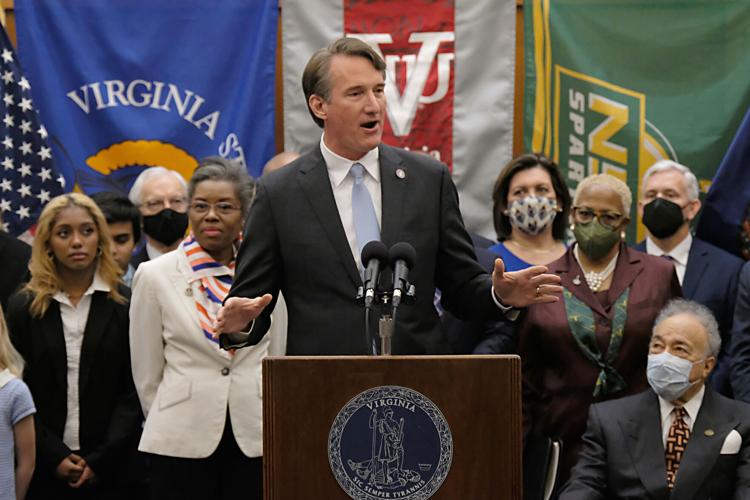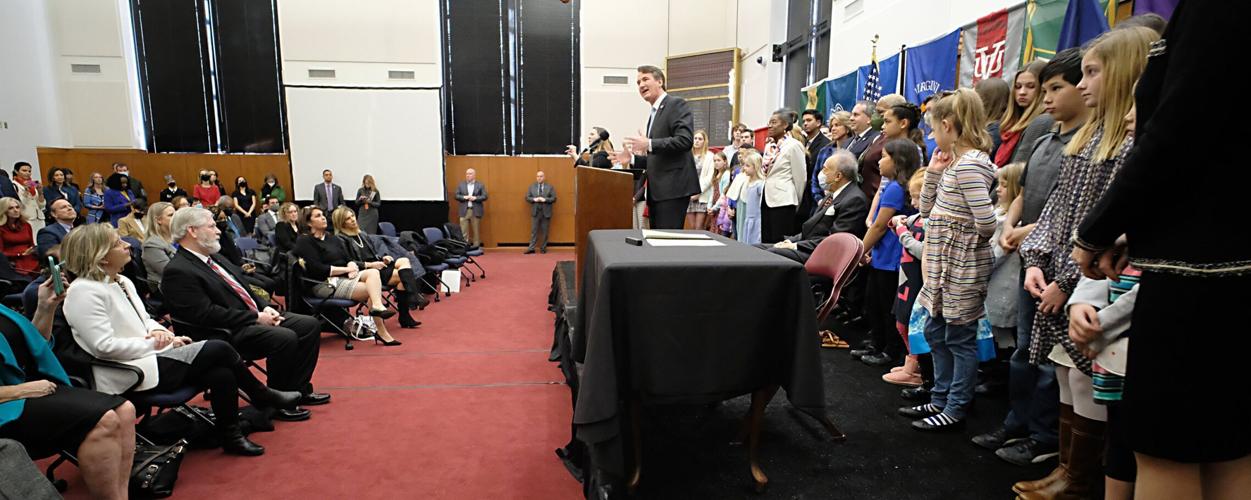Gov. Glenn Youngkin in January 2022 announced an agreement with officials at a number of Virginia colleges and universities to collaborate on development of lab schools.
Gov. Glenn Youngkin’s push to open more privately run public schools got the support of a number of Virginia higher education leaders who signed onto a proposal by the administration to open charter schools run by their institutions and funded by the state.
On Thursday, Youngkin and more than 30 higher education officials, surrounded by children and teens from Virginia schools, touted the need for “innovation” in K-12 education in Virginia.
“We stand together because we know there is an opportunity for us to innovate in K-12 education,” the governor said during the event at the Patrick Henry Building.
Youngkin promoted legislation moving through the General Assembly that would let any public or private college or university open a charter school, or convert an existing school into a charter school, with approval of the state Board of Education.
People are also reading…
While Youngkin said the bill is centered on colleges and universities, it would also allow private, for-profit businesses to open charter schools using public dollars.
The bill is part of a package of charter school bills that seek to expand the number of schools that operate outside the control of local school boards but are funded with public dollars. Other Youngkin-backed legislation would allow the state Board of Education and regional charter agencies to approve applications for new charter schools.
Right now, only local school boards can approve charter school applications.
Several Democratic lawmakers have said they oppose the expansion of charter schools, arguing that all Virginia students would be better served if state funds were directed at existing public schools. At least two Democratic senators have said they are open to the idea.
On Thursday, university and college presidents signed onto a memo supporting the legislation and a $150 million expenditure to help fund the launch of the schools.
It’s unclear which college and university presidents signed on and which didn’t. The administration did not provide a list, despite multiple requests.
Javaune Adams-Gaston, the president of Norfolk State University, a historically Black university, expressed support for Youngkin’s plan.
“We come from a tradition where we needed to do what was not being done for an underserved group of people, African Americans, who didn’t have the opportunity to pursue higher education in a way that needed to happen,” Adams-Gaston said.
The bill directs the board to give “substantial preference” to any application from a historically Black college or university, and any application to open a charter school in an “underserved community,” defined as an area where many students qualify for free or reduced-price lunch.
Adams-Gaston said the promised $150 million in funding is “critical to the success.”
Representatives from several Richmond-area institutions — Virginia Commonwealth University, Reynolds Community College and Virginia State University — all expressed support for the bill during Thursday’s event and when it came before a Senate panel on Thursday afternoon.
The representative from VSU noted that Sen. Jennifer McClellan, D-Richmond, attended a public school operated by the university when she was a child.
Sen. Ghazala Hashmi, D-Chesterfield, who grew up in Georgia, said during the hearing that she too had attended a school operated by a higher education institution, but noted that it was modeled as a way for teachers in training to get experience. She expressed skepticism about the bill because it would allow all institutions, even those without teacher training programs, to operate a charter school.
The Senate panel on Thursday afternoon ultimately recommended approval of the bill, an early sign of support from the Democratic-controlled chamber.
Opponents of the bill included the Virginia School Boards Association, which said the bill could violate the state’s constitution, which gives power over schools to local school boards.


















